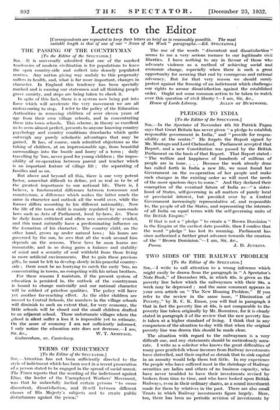Letters to the Editor
[Correspondents are requested to keep their letters as brief as is reasonably possible. The most suitable length is that of one of our "News of the Week" paragraphs.—Ed. SeEcrxroa.1 THE PASSING OF THE COUNTRYMAN [To the Editor of the SPECTATOR.] SIR,—It is universally admitted that one of the marked tendencies of modern civilization is for populations to leave the open country-side and collect into densely populated centres. Any nation giving way unduly to this propensity suffers in health, and, what is far more important, changes in character. In England this tendency has been specially marked and is causing our statesmen and all thinking people grave anxiety, and steps are being taken to check it.
In spite of this fact; there is a system now being put into force which will accelerate the very movement we are all endeavouring to stop. I refer to the policy of the Education Authorities in removing children of over eleven years of age from their own village schools, and in concentrating them into town schools. This scheme, in theory so excellent as to seem almost perfect, presents to anyone knowing country psychology and country conditions drawbacks which quite outweigh any purely scholastic advantages that may be gained. It has, of course, such admitted objections as the taking of children, at an impressionable age, from beautiful surroundings into the bustle and hurry of a town ; daily travelling by 'bus, never good for young children ; the impos- sibility of co-operation between parent and teacher which is an important feature of village life ; the separating of families and so on.
But above and beyond all this, there is one very potent factor, somewhat difficult to define, yet so real as to be of the greatest importance to our national life. There is, I. believe, a fundamental difference between townsman and countryman, a difference which makes the latter much the same in character and outlook all the world over, while the former differs according to his different nationality. Now the life of the town child is mainly regulated by man-made laws such as Acts of Parliament, local by-laws, &c. These he daily hears criticized and often sees successfully evaded, and this must naturally have a predominating influence on the formation of his character. The country child, on the other hand, grows up under natural laws ; his hours are governed by the sun, he sees that all the work around him depends on the seasons. These laws he soon learns are immutable, and in so doing gains a balance and stability of mind and a serenity of soul withheld from those living in more artificial enviromnents. But to gain these precious gifts, he must be left to develop slowly in his peaceful country- side ; there must be no hurrying to catch the early 'bus, no concentrating in towns, no competing with his urban brothers.
For these reasons I maintain, if the present system of education is persisted in, the outlook of the countryman is bound to change materially and our national character will be robbed of priceless qualities. The policy will have yet another far-reaching effect. As the elder children are moved to Central Schools, the numbers in the village schools will diminish to such an extent that, for very economy, the little schools will be closed and the small children drafted to an adjacent school. Those unfortunate villages where the school is silent suffer a loss it is impossible yet to estimate. On the score of economy I am not sufficiently informed. I only notice the education rate does not decrease.—I am,


























 Previous page
Previous page